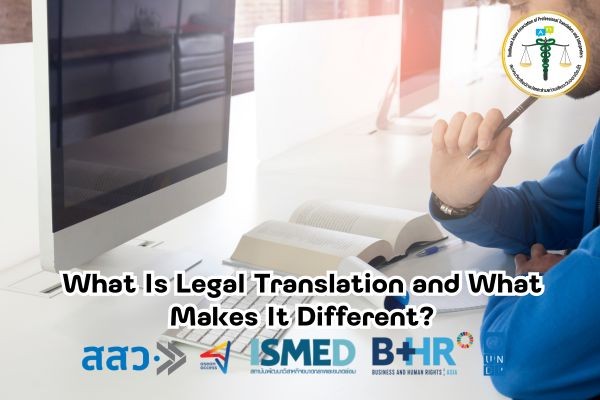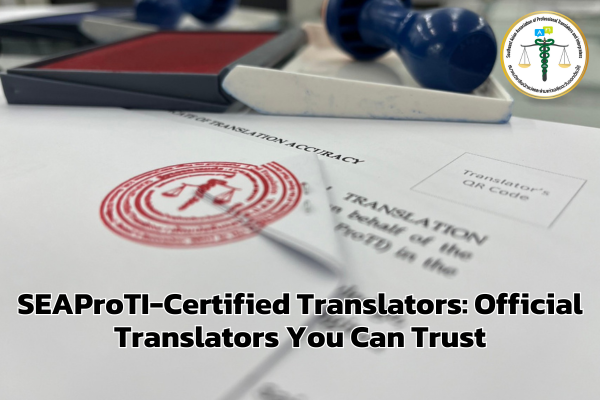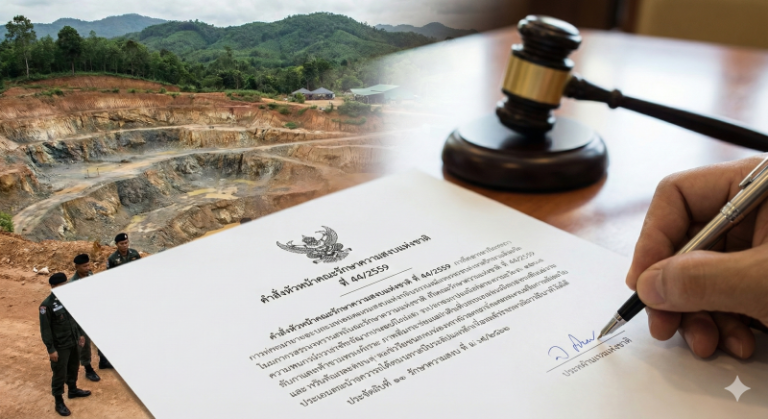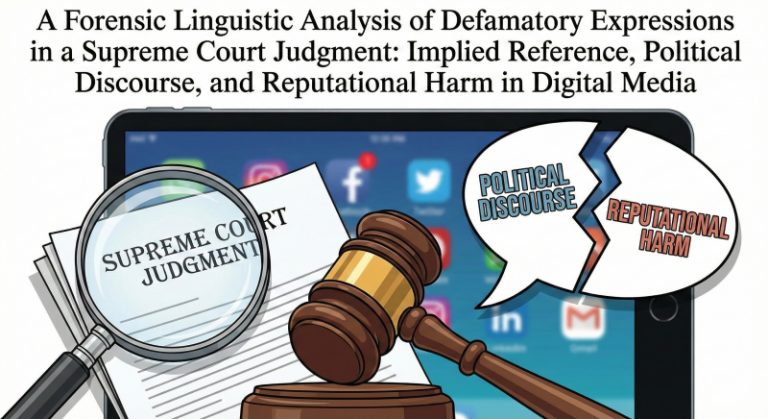What Is Legal Translation and What Makes It Different?
5 May 2025, Bangkok – Legal translation is not simply the act of replacing words from one language with another—it is a highly specialized field that sits at the intersection of language, law, and culture. As globalization increases the demand for cross-border legal cooperation, accurate and culturally appropriate legal translation has become more crucial than ever.
In this article, we’ll explore what legal translation is, why it’s different from other types of translation, and what makes a legal translator truly qualified.
Understanding Legal Translation: More Than Words
At its core, legal translation involves translating documents used within legal systems, such as contracts, court transcripts, witness statements, legislation, certificates, and wills. However, unlike general or technical translation, legal translation requires knowledge of the source and target jurisdictions’ legal systems, legal terminologies, and procedural contexts.
This field is made more complex by the fact that law is not universal—it is deeply embedded in culture, religion, and national identity. As a result, even documents that appear similar in form may serve different legal functions in different countries.
Examples of Legal-Cultural Contexts
- Saudi Arabia: The legal system is heavily influenced by Islamic law, although secular codes have been introduced to support international business.
- Morocco: The country combines elements of French civil law with Islamic legal principles, reflecting its colonial past and cultural heritage.
This diversity of legal traditions underlines the importance of understanding how laws operate, not just how they are worded.
Legal Translation vs. General Translation
What sets legal translation apart from standard document translation? It’s all about accuracy, context, and consequences.
1. Precision is Critical
A minor mistranslation in a legal document can:
- Invalidate the entire document
- Lead to legal disputes
- Result in financial losses or even imprisonment
Unlike general texts, legal texts leave no room for ambiguity. Courts, immigration authorities, and regulatory bodies expect legal translations to be clear, exact, and jurisdictionally correct.
2. Legal Terminology and Style
Legal language is notoriously complex:
- It uses technical jargon (“legalese”) that may not have direct equivalents in other languages.
- Sentences tend to be long and syntactically intricate.
- The tone is formal and prescriptive.
Legal translators must often deal with passive constructions, abstract nouns, and legal formulae. Moreover, some legal expressions are non-translatable in the literal sense and require the use of conceptual equivalents—a skill no machine translation system can reliably reproduce.
Legal Translation Must Be Human
Despite the rise of AI tools, legal translation remains a domain that requires human expertise. Here’s why:
- Machine translation cannot understand legal context.
- There are no perfect word-for-word equivalents for many legal terms.
- Translators often need to add explanatory notes to convey the legal significance of a phrase in the source language.
- Legal documents are often used in high-stakes situations such as litigation, contract signing, immigration, or estate planning.
As such, using tools like Google Translate or unqualified translators for legal work can have serious legal repercussions.
Types of Legal Documents That Require Professional Translation
Legal translation spans a wide range of documents, including but not limited to:
- Personal identity documents (birth certificates, marriage certificates)
- Contracts and agreements
- Court decisions and witness statements
- Articles of incorporation
- Visa application documents
- Powers of attorney
- Patent and intellectual property filings
- Financial and government records
- Legal opinions and academic papers
Each of these documents has unique legal consequences and therefore must be handled with utmost care.
Who Is Qualified to Translate Legal Documents?
Legal translation is governed differently around the world:
- Argentina and Brazil: Legal translators must be state-certified.
- Netherlands, Sweden, and Spain: Translators must take an official oath, pass exams, and follow regulatory oversight.
- Italy: All legal documents must be certified or notarized by legal professionals.
- United Kingdom and United States: No strict licensing, but legal translation is often performed by LSPs (Language Service Providers) who issue certificates of accuracy or belong to professional associations.
Regardless of the country, professional legal translators must be trained not only in language but also in law and legal systems. Many hold degrees in legal studies, linguistics, or translation and interpreting, and undergo rigorous testing.
Why Legal Translation Takes More Time (and Costs More)
Legal translation is time-intensive and intellectually demanding because it involves:
- In-depth research into legal terms and their target-language equivalents
- Attention to formatting and document structure (which often must match the original exactly)
- Cross-checking meanings within both legal frameworks and cultural contexts
- Quality control and certification for official use
Unlike marketing or general texts, a legal document must often go through multiple levels of verification, including review by legal professionals, sworn translators, or notaries.
Avoiding Legal Risks: Hire a Specialist
Because the stakes are so high, working with qualified legal translators is non-negotiable. Choosing an inexperienced or unaccredited translator may save money in the short term, but it can cause major financial and legal harm in the long run.
When selecting a legal translation provider, ensure that:
- They are certified or recognized by a professional body (e.g., SEAProTI in Southeast Asia, ATA in the U.S., NRPSI in the UK)
- They have experience in the relevant legal domain (e.g., immigration, commercial law, intellectual property)
- They understand both legal systems involved
- They are willing to certify and notarize the final translation if required
Conclusion: Legal Translation Is a Specialized Profession
In summary, legal translation is one of the most challenging and sensitive types of translation. It demands linguistic fluency, legal expertise, and cultural sensitivity—often all at once. Errors are not just inconvenient—they can be catastrophic.
Whether you are applying for a visa, defending a case in court, or entering into a cross-border partnership, your legal documents deserve the precision only a professional human translator can provide.
SEAProTI’s certified translators, translation certification providers, and certified interpreters:
The Southeast Asian Association of Professional Translators and Interpreters (SEAProTI) has officially announced the criteria and qualifications for individuals to register as “Certified Translators,” “Translation Certification Providers,” and “Certified Interpreters” under the association’s regulations. These guidelines are detailed in Sections 9 and 10 of the Royal Thai Government Gazette, issued by the Secretariat of the Cabinet under the Office of the Prime Minister of the Kingdom of Thailand, dated July 25, 2024, Volume 141, Part 66 Ng, Page 100.
To read the full publication, visit: the Royal Thai Government Gazette
การแปลเอกสารทางกฎหมายคืออะไร และอะไรที่ทำให้แตกต่าง
5 พฤษภาคม 2568, กรุงเทพมหานคร – การแปลเอกสารทางกฎหมาย (Legal Translation) ไม่ใช่แค่การแทนที่คำจากภาษาหนึ่งไปยังอีกภาษาหนึ่งเท่านั้น หากแต่เป็นศาสตร์เฉพาะทางที่ตั้งอยู่บนจุดตัดของ ภาษา กฎหมาย และวัฒนธรรม ในยุคโลกาภิวัตน์ที่ความร่วมมือระหว่างประเทศเพิ่มขึ้น ความต้องการการแปลเอกสารทางกฎหมายอย่างแม่นยำและสอดคล้องกับบริบททางวัฒนธรรมจึงทวีความสำคัญมากขึ้น
บทความนี้จะพาคุณสำรวจว่า “การแปลเอกสารทางกฎหมาย” คืออะไร เหตุใดจึงแตกต่างจากการแปลทั่วไป และนักแปลประเภทนี้ควรมีคุณสมบัติอย่างไร
ความหมายของการแปลเอกสารทางกฎหมาย
การแปลเอกสารทางกฎหมาย หมายถึง การแปลเอกสารที่ใช้ในกระบวนการยุติธรรม เช่น สัญญา คำพิพากษา บันทึกการพิจารณาคดี คำให้การ เอกสารแสดงตน พินัยกรรม หรือบทบัญญัติกฎหมาย เป็นต้น ซึ่งแตกต่างจากการแปลทั่วไป เพราะผู้แปลต้องมีความรู้ทางกฎหมายของทั้งประเทศต้นทางและประเทศปลายทาง รวมถึงเข้าใจความแตกต่างของระบบกฎหมายอย่างลึกซึ้ง
ตัวอย่างความหลากหลายของระบบกฎหมาย
- ซาอุดีอาระเบีย: ใช้ระบบกฎหมายตามหลักอิสลาม (ชารีอะฮ์) เป็นหลัก แต่เสริมด้วยกฎหมายทางโลกบางส่วนเพื่อรองรับธุรกิจระหว่างประเทศ
- โมร็อกโก: ใช้ระบบกฎหมายแบบผสมระหว่างกฎหมายฝรั่งเศสและกฎหมายอิสลาม
บริบททางกฎหมายเช่นนี้ทำให้ไม่สามารถแปลแบบ “ตรงตัว” ได้ ผู้แปลต้องแปลงสารตาม หน้าที่ทางกฎหมายของเอกสาร และความเข้าใจต่อบริบทของระบบยุติธรรมในแต่ละประเทศ
อะไรที่ทำให้การแปลกฎหมายแตกต่างจากการแปลทั่วไป
1. ความแม่นยำคือหัวใจหลัก
เอกสารกฎหมายเป็นเอกสารที่ต้อง “แม่นยำ 100%” การแปลผิดเพียงเล็กน้อยอาจทำให้:
- เอกสารไม่มีผลทางกฎหมาย
- คู่กรณีเข้าใจผิด นำไปสู่ข้อพิพาท
- เกิดความเสียหายทางการเงินหรือทางอาญา
- เอกสารทางกฎหมายจึงต้องการผู้แปลที่มีความเข้าใจทั้งภาษาและระบบกฎหมายในเชิงลึก
2. ภาษาเฉพาะทางและรูปแบบการเขียนที่ซับซ้อน
ภาษากฎหมายหรือ “legalese” มักใช้คำศัพท์ที่ไม่ค่อยใช้ในชีวิตประจำวัน มีโครงสร้างประโยคยาว ซับซ้อน และเป็นทางการมาก เช่น:
- นิยมใช้ประโยคเชิงกำหนด (prescriptive sentences)
- หลีกเลี่ยงการใช้ Passive voice
- มีการซ้อนเงื่อนไขทางกฎหมายหลายชั้นในประโยคเดียว
- ผู้แปลจึงต้องตีความเจตนารมณ์ของข้อความและแปลงเป็นภาษาที่สื่อสารได้อย่างแม่นยำในระบบกฎหมายปลายทาง
เหตุใดจึงไม่ควรใช้เครื่องมือแปลอัตโนมัติ
แม้ปัจจุบันจะมีเทคโนโลยีช่วยแปลภาษา แต่ เอกสารทางกฎหมายยังคงต้องใช้มนุษย์แปล ด้วยเหตุผลดังนี้:
- เครื่องมือไม่เข้าใจบริบททางกฎหมาย
- ไม่มีความสามารถในการเลือกคำที่มีน้ำหนักทางกฎหมาย
- ไม่สามารถใช้แนวคิด “ความหมายเชิงแนวคิด” (conceptual equivalent) ได้เมื่อไม่มีคำที่เทียบได้โดยตรง
เอกสารเช่น คำให้การเป็นลายลักษณ์อักษร สูติบัตร หรือคำฟ้อง ล้วนเป็นเอกสารที่ต้องใช้ในการพิจารณาทางกฎหมายหรือธุรกรรมสำคัญ จึงต้องการความแม่นยำสูงสุด
เอกสารแบบใดบ้างที่ต้องการการแปลทางกฎหมาย
ประเภทของเอกสารที่ต้องการนักแปลกฎหมาย ได้แก่:
- สูติบัตร ทะเบียนสมรส ทะเบียนหย่า
- สัญญาซื้อขาย เช่าซื้อ หุ้นส่วนธุรกิจ
- คำพิพากษา หรือบันทึกคำให้การ
- เอกสารยื่นขอวีซ่า หรือถิ่นที่อยู่
- พินัยกรรม มรดก และเอกสารสิทธิ
- เอกสารทรัพย์สินทางปัญญา
- รายงานการประชุม การก่อตั้งบริษัท
เอกสารเหล่านี้มักใช้ในกระบวนการทางกฎหมายหรือยื่นต่อหน่วยงานราชการในต่างประเทศ
คุณสมบัติของนักแปลเอกสารทางกฎหมาย
ในแต่ละประเทศมีการควบคุมคุณวุฒิของนักแปลแตกต่างกัน:
- อาร์เจนตินา และ บราซิล: นักแปลต้องได้รับการรับรองจากรัฐ
- เนเธอร์แลนด์ สวีเดน สเปน: นักแปลต้องกล่าวปฏิญาณและอยู่ภายใต้การควบคุม
- อิตาลี: การแปลต้องรับรองโดยผู้ประกอบวิชาชีพทางกฎหมาย
- สหราชอาณาจักร และสหรัฐฯ: ไม่มีการควบคุมโดยตรง แต่นักแปลต้องผ่านการรับรองหรือเข้าร่วมองค์กรวิชาชีพ เช่น NRPSI หรือ ATA
เหตุใดการแปลกฎหมายจึงใช้เวลานานและมีต้นทุนสูง
เพราะนักแปลต้อง:
- ศึกษาข้อกฎหมายทั้งสองประเทศ
- ตรวจสอบรูปแบบเอกสารให้ถูกต้อง
- เลือกคำศัพท์ที่สื่อเจตนาทางกฎหมายได้อย่างชัดเจน
- ตรวจทานโดยผู้มีความรู้ด้านกฎหมาย (ในบางกรณี)
งานแปลกฎหมายจึงต้องใช้ทั้งเวลา ความเชี่ยวชาญ และการตรวจสอบหลายชั้น เพื่อให้แน่ใจว่าเอกสารมีผลทางกฎหมายอย่างสมบูรณ์
สรุป: การแปลกฎหมายไม่ใช่งานทั่วไป
การแปลเอกสารทางกฎหมายเป็นศาสตร์เฉพาะทาง ที่ต้องอาศัยความรู้ด้านภาษา กฎหมาย และวัฒนธรรมพร้อมกัน ความผิดพลาดเพียงเล็กน้อยอาจนำไปสู่ความเสียหายใหญ่หลวง ไม่ว่าจะด้านกฎหมาย การเงิน หรือชื่อเสียง
หากคุณมีเอกสารสำคัญที่ต้องแปลเพื่อใช้ทางกฎหมายในประเทศหรือต่างประเทศ อย่าเสี่ยงกับการใช้บริการที่ไม่มีความเชี่ยวชาญ เลือกนักแปลกฎหมายมืออาชีพหรือหน่วยงานที่ได้รับการรับรอง เท่านั้น
เกี่ยวกับนักแปลรับรอง ผู้รับรองการแปล และล่ามรับรองของสมาคมวิชาชีพนักแปลและล่ามแห่งเอเชียตะวันออกเฉียงใต้
สมาคมวิชาชีพนักแปลและล่ามแห่งเอเชียตะวันออกเฉียงใต้ (SEAProTI) ได้ประกาศหลักเกณฑ์และคุณสมบัติผู้ที่ขึ้นทะเบียนเป็น “นักแปลรับรอง (Certified Translators) และผู้รับรองการแปล (Translation Certification Providers) และล่ามรับรอง (Certified Interpreters)” ของสมาคม หมวดที่ 9 และหมวดที่ 10 ในราชกิจจานุเบกษา ของสำนักเลขาธิการคณะรัฐมนตรี ในสำนักนายกรัฐมนตรี แห่งราชอาณาจักรไทย ลงวันที่ 25 ก.ค. 2567 เล่มที่ 141 ตอนที่ 66 ง หน้า 100 อ่านฉบับเต็มได้ที่: นักแปลรับรอง ผู้รับรองการแปล และล่ามรับรอง

























